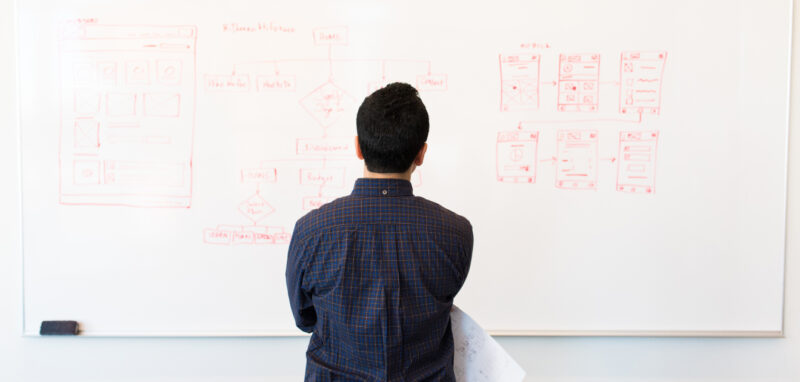
6 Things No One Tells You About The Whiteboard Interview
Regardless of whether you’re going into your first whiteboard interview or you’re a seasoned engineer, standing up in front of strangers who are there to judge your abilities can be even more stressful than traditional interviews. But this type of technical interview doesn’t have to be daunting, as there are a number of techniques which can help you to prepare more effectively, as well as better understand what your interviewers are looking for. Read on for six things you might not know about the whiteboard interview.
Being a great engineer doesn’t necessarily make you great at whiteboardingA common pitfall is underestimating the difference between technical prowess and whiteboarding abilities. Just as the best doctors don’t necessarily have the top MCAT scores, being a stellar engineer doesn’t automatically make you effective in technical interviews. Sure, your technical abilities can greatly help to quickly and correcting answer the questions your given, but the method of delivery is often just as important. That said, there are plenty of tactics for preparing for this type of interview, so commit to practicing enough that your skills will shine through.
Practicing on your computer doesn’t count (as much)While it’s certainly important to practice the technical aspect of these questions, the softer side of these interviews can often be what trips people up. Even small things, like how your hand smudges the ink on the whiteboard, can be disruptive to your thought process, so do your best to simulate the actual environment as you’re practicing.
If you’re interviewing a lot, it may even be worth buying a whiteboard to practice with. In addition, practice your answers while standing and speak out loud as you would in the interview, rather than simply solving the problems on your laptop.
You can learn lots from watching someone else practicePracticing on your own is crucial, but there are many ways you can learn from watching someone else give mock answers. Ask a technical friend or colleague if they’d be willing to spend an hour or so practicing with you. On the one hand, if they’re great at this type of question, you may be able to adopt some of their strategies. If they get tripped up or aren’t good presenters, on the other hand, you can learn what not to do.
Asking questions is encouragedWhile the whiteboard interview can feel more like a one-way conversation—particularly compared with culture fit or behavioral interviews—that doesn’t mean you can’t ask questions, and doing so may help you arrive at more meaningful answers. Once the interviewer asks the initial question, take a moment to consider whether everything is entirely clear (it probably won’t be!) before diving in. Ask any follow-up questions before even starting, and continue asking questions if they arise as you’re giving your answer. In addition to decreasing the chances that you make an error due to a simple misunderstanding, asking questions can demonstrate your ability to think critically.
Your thought process is more important than what you writeWhile arriving at the right answer is great, interviewers are generally more interested in the process you took to arrive there. A wrong answer accompanied by a valid and well-communicated thought process won’t necessarily make or break a hiring decision, as laying out your steps to solving the problem can help the interviewer understand where you made a mistake.
During the interview, it can be easy to get wrapped up in your thoughts and simply keep scribbling, but spend extra time practicing your multitasking. Hard as it sounds, you should be able to explain your thinking as you’re writing, so practice this until it comes naturally.
Confidence is keyThis isn’t a new premise when it comes to interviews, but confidence is just as, if not more, important when you’re whiteboarding. Even your body language while you’re standing in front of your interviewer(s) can influence how well they like you and their assessment of your abilities—and if you’re obviously guessing your own answers, they’ll do the same.
While it’s hard to manufacture confidence, practice can greatly help to reduce your nerves and give you faith in your abilities. Practice on your own but also in front of others; Even if it’s family or a friend who doesn’t understand engineering, simply ask them to evaluate how confident you are as you talk though your answers.
Related blog posts

Is My Job Too Much Work for One Person?
4 Strategies to Address Feeling Overwhelmed at Work Whether you work for a startup or...

Are You Burnt Out (Or Do You Really Just Hate Your Job)?
The difference between the two and what to do about it Your career may be a large part of your...

4 Things Every Engineer Must Do Before A Technical Interview
In order to become an expert on something, mere talent or aptitude is not enough. According to...

Where Do Engineer Salaries Pay the Best (Highest) Standard of Living?
Opportunity shifts from higher cost-of-living markets The rise in remote work prompted...

What Makes You Love Your Job? 6 Crucial Job Happiness Indicators
In a world with increasingly long workweeks and demanding workplace expectations, there’s a...

Salary Negotiation 101: How to Know and Ask For Your Salary Worth
Salary negotiation is a difficult task for everyone. That goes for whether you’re just...

